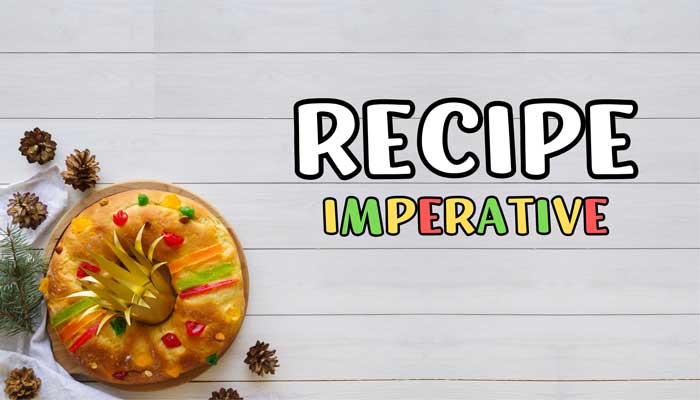Vocabulary
A recipe is an instruction for action. Action is a verb. Since the imperative form depends on the verb’s ending in the infinitive, let’s divide the verbs into two groups. The first group consists of verbs ending in “-ar”:
- juntar (to join), adicionar (to add), misturar (to mix), colocar (to place), decorar (to decorate)
The second group includes verbs ending in “-er” and “-ir”:
- mexer (to stir), aquecer (to heat), bater (to beat), cozer (to bake), servir (to serve)
All these verbs are appropriate for the imperative form, which means that the same rule applies to all of them, and we will look at that a little later.
To have something to refer to, let’s look at a recipe for a Portuguese cake – Bolo de Natal (Christmas Cake). Christmas is still far away, but preparation needs to start in advance!
Let’s add vocabulary with the ingredients so that we can work with them until the end of the article. So, to prepare the cake, we will need:
- farinha (flour), fermento em pó (baking powder), açúcar (sugar), frutas cristalizadas (candied fruits), uvas-passas (raisins), nozes (nuts), manteiga (butter), ovo (egg), leite (milk), canela (cinnamon)
Are you already salivating?
Imperative on “você” (you formal)
Let’s start with the most necessary and commonly used. This is the imperative for addressing “você”. In the table below, see how the ending of regular verbs changes:
| Imperativo Verbos Regulares “Você” |
|
| Infinitive end | Imperative end |
| -ar | -e |
| -er | -a |
| -ir | -a |
1. Junte a farinha, o fermento, a canela, as nozes e o sal. (Combine the flour, yeast, cinnamon, nuts, and salt.)
2.Misture-os bem na taça número um. (Mix them well in bowl number one.)
If the verb in the infinitive form ends in “-çar,” “-ser,” “-sar,” and “-gar,” due to pronunciation peculiarities, they change as follows:
| Imperativo Verbos Regulares “Você” |
|
| Infinitive end | Imperative end |
| –çar | -ce |
| -сer | –ça |
| -сar | -que |
| -gar | -gue |
3. Aqueça o forno a 180°C. (Preheat the oven to 180 degrees.)
4. Comece a juntar a manteiga com o açúcar e depois bata-os até obter uma mistura cremosa na taça número dois. (Start mixing the butter with the sugar and then beat them until you get a creamy mixture in bowl number two.)
Surely you remember that in the Portuguese language there are regular verbs in the present tense that have only one exception – the form for the pronoun “eu” (I). For example, ler (to read) – eu leio (I read), vestir (to wear) – eu visto (I wear), and so on. In the imperative for such verbs there will also be an exception. Specifically, for the imperative form for the pronoun você, we take the form of the verb in the present tense and add the ending “-a”:
5. Leia a receita e vista o avental antes de começar a cozinhar. (Read the recipe and put on the apron before you start cooking.)
And in order to warn a person against making a mistake, we simply add the negative particle “não” (no):
- Não misture rápido as taça um e dois. Não se despache! (Do not mix bowls one and two quickly. Do not rush!)
Imperative on “tu” (you informal)
Let’s switch to writing the recipe using the “tu” address. For example, let’s imagine we are teaching our friend or relative to cook. So, let’s start simple – the affirmative imperative in “tu”. It represents the form of the verb for the pronoun você in the Presente Indicativo (Present Simple). That is, the endings of the verbs change as follows:
| Imperativo Verbos regulares “Tu” |
|
| Infinitive end | Imperative end |
| -ar | -a |
| -er | -e |
| -ir | -e |
By and large, we reminded you of a rule from the Present Indicative. By saying that there are no exceptions here, we mean that after undergoing an exception in the Present Indicative, the verb form remains the same in the Imperative.
5. (Tu) Adiciona os ovos, um a um, e mexe bem após cada adição. (Add the eggs one by one, and stir well after each addition.)
6. Coloca a mistura de ingredientes secos aos poucos, alternando com o leite. (Put the mixture of dry ingredients little by little, alternating with the milk.)
Creating the negative form of the imperative for “tu” is perhaps the only thing that requires more manipulation of the verb. We need to not only add the negative particle “não”, but also take the affirmative imperative form for você and add the “-s” ending.
- Não adiciones nada extra. (Do not add anything extra.)
- Não leias receitas em sites duvidosos. (Do not read recipes on questionable sites.)
Imperative for communicating with a company
We can address not just one person, but several, or even hundreds of people. Fortunately, we won’t need to make numerous manipulations of the verb form. We just need to take the imperative form for “você” and add the “-m” ending.
7. (Vocês) Adicionem as frutas cristalizadas, as uvas-passas e as nozes picadas e mexam tudo muito bem. (Add the dried fruits, raisins, and nuts and mix everything very well.)
8. Coloquem a massa numa forma e cozam no forno por aproximadamente 45 minutos. (Place the dough in a mold and bake in the oven for about 45 minutes.)
Similarly, we handle the negative imperative:
- Não retirem o bolo do forno, antes de estar pronto. (Do not take the cake out of the oven before it is ready.)
Conclusion
Quando estiver frio, decorar a gosto e servir. (When it is cold, decorate to taste and serve.)
And now our pie is ready! And your knowledge about Imperative in Português is also completed! When we combine grammar and a practical, life topic, we kill two birds with one stone and develop in several directions at once!

